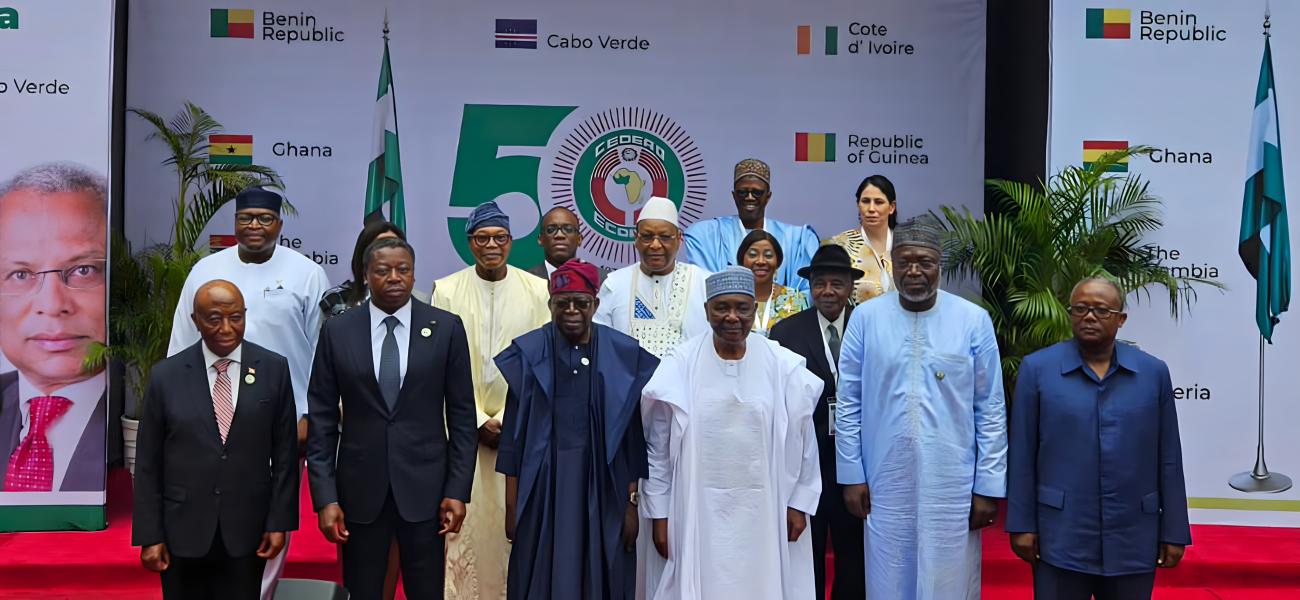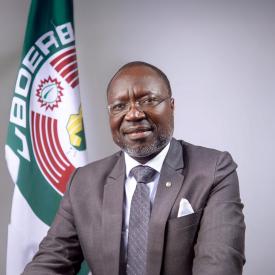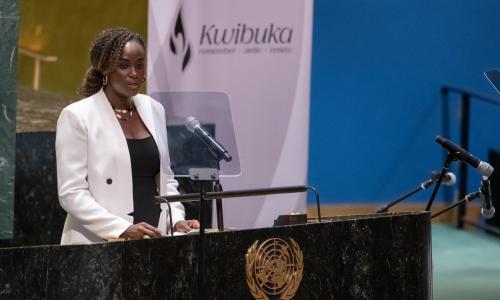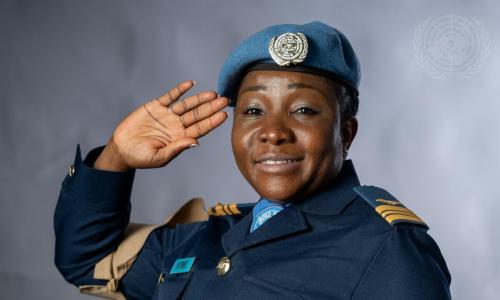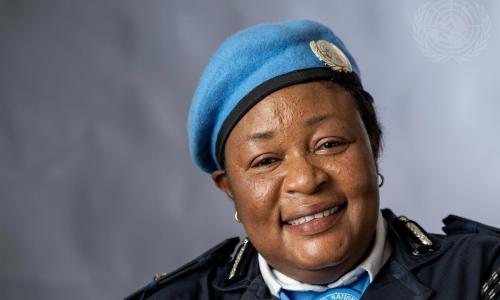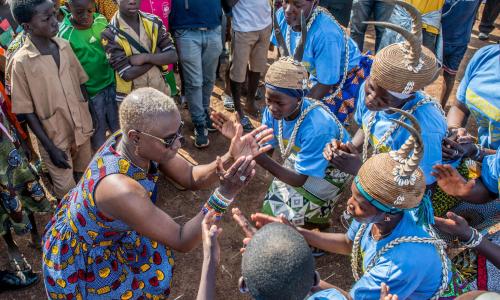The Economic Community of West African States (ECOWAS), established on 28 May 1975, aims to promote economic and political integration among its member states. To mark its 50th anniversary, Africa Renewal’s Kingsley Ighobor spoke with the President of the ECOWAS Commission, Dr. Omar Alieu Touray, to assess the regional body’s achievements, challenges, and prospects. Below are edited excerpts from the interview.
Africa Renewal: ECOWAS is 50 years old. What would you say are the key achievements of the regional body?
H.E. Dr. Omar Alieu Touray:
Since 1975, ECOWAS has made significant strides. One major area is peace and security. The UN is very familiar with our interventions in Sierra Leone, Liberia, and, more recently, The Gambia—ensuring the will of the Gambian people was respected. ECOWAS has also supported Member States in their drive for good governance through democratic processes.
Now, if we look at our core mandate—regional integration—we can proudly say ECOWAS is the most advanced regional economic bloc on the African continent. We have integrated our people through the Free Movement Protocol, facilitating the movement of over 400 million citizens. Our Trade Liberalization Scheme and the ECOWAS Common External Tariff support intra-community trade.
We are also investing in major regional infrastructure such as the Lagos-Abidjan Corridor. We're currently mobilizing resources to implement it, with studies estimating an investment need of $15 billion and an internal rate of return of around 15 percent, which is excellent. The Abidjan–Praia Corridor has just started, and I just approved procurement contracts related to it. We are also developing the West Africa Power Pool to link all Member States to a regional electricity grid. At the same time, we’re promoting off-grid renewable energy through the ECOWAS Centre for Renewable Energy and Energy Efficiency (ECREEE) in Cape Verde. These are just a few examples of the regional projects we are proud of.
When you say “corridor,” what exactly do you mean?
The vision is to build a regional highway stretching from Lagos to Abidjan, which passes through Benin, Togo, and Ghana, and then from Abidjan to Praia, with a maritime link connecting Cape Verde to Dakar. There are also inland corridors as part of our regional master plan.
What are the persistent challenges ECOWAS has faced over the years, and how are you addressing them?
We have challenges of underdevelopment, of low productivity [and] they are the structural challenges facing our economies.
Our intra-community trade remains below 20 percent, while in the EU, for example, it’s around 60–70 percent. ASEAN (the Association of Southeast Asian Nations) countries also trade heavily among themselves.
To improve, we need to invest in infrastructure and the productive sector. We are simply not producing enough to meet the demands of regional trade.
Another vexing problem is non-tariff barriers. When traveling across the region, one encounters unnecessary non-tariff barriers, most not necessary.
While we understand the need for security-especially given the region's volatility-this should not come at the expense of free movement and trade.
Energy is also a serious concern. It's expensive and, in many cases, not readily available.
ECOWAS has played a role in peacekeeping across the region. How has your approach to conflict prevention and resolution evolved given current political developments in the region?
Conflicts today are different from those of the past. We used to deal with clearly defined rebel groups. Now we’re facing hybrid threats like terrorism, which are harder to understand and combat because the actors are not easily identifiable, and their objectives are not too clear.
This evolving nature of conflict requires a new approach-one that is collaborative, adaptive, and multi-dimensional. That’s why we’re reacting with our regional standby force, working with our partners, and implementing a comprehensive Plan of Action to address these threats effectively.
Intra-regional trade remains low, yet ECOWAS is considered the most integrated region in Africa. What lessons can other regions draw from ECOWAS, and how does your work align with the African Continental Free Trade Area (AfCFTA)?
Yes, despite low trade figures-around 12 to 15%-ECOWAS is still Africa’s most integrated region. We share our experiences regularly with other Regional Economic Communities (RECs). Just recently, we handed over the chairmanship of the REC platform and hosted several REC delegations eager to learn from our experience.
They were particularly interested in how we finance our operations. ECOWAS is largely funded by a 0.5% community levy on imports from outside the region. This financing mechanism is unique and effective. We also benefit from development partners for specific projects, which we deeply appreciate.
Our protocols on free movement are another area of interest. some may feel that free movement allows bigger countries to flood smaller countries. In the case of ECOWAS, it’s not the case. People move primarily for trade and return home.
Our Trade Liberalization Scheme also aligns well with the AfCFTA. We see AfCFTA as an extension of what we've already been doing. It provides a broader market-1.5 billion people-and we hope our regional experiences will ease the transition into this continental framework.
What role can women and young people play in regional development? Do you have initiatives that support these groups?
Women and youth are central to ECOWAS Vision 2050, which emphasizes inclusive, equitable, and sustainable development. They make up 70–80 percent of the population, so even when we don't clearly say it, our policies are ultimately for them.
We have a dedicated department for human development, which includes a strong focus on gender. Our ECOWAS Gender Development Centre in Dakar focuses on women's empowerment, education, health—including maternal health and programmes addressing obstetric fistula and capacity building.
For youth, education and skills training are top priorities. We believe that without building capacity, we cannot lift people out of poverty. Insecurity in the region is often tied to unemployment. Many young people join armed groups not out of ideology, but due to lack of opportunity. So, capacity development is critical for peace and stability.
Given the evolving needs of Member States, some say ECOWAS must do more to remain relevant. How do you respond to that?
I agree. Constructive criticism helps us grow. We may not always agree with what critics say, but the spirit behind such feedback is often a desire to see a stronger, more effective ECOWAS. They just want to see a better community.
People, especially the youth, are impatient—and rightly so. We must listen to their frustrations and expectations if we are to remain relevant.
Finally, what is your vision for ECOWAS over the next 10 to 20 years, and what legacy would you like to leave behind?
Looking ahead, peace and security must remain our top focus, because we cannot do anything without them. Africans are very enterprising and ambitious, but they cannot realise their potential without peace and security.
We must also invest in the productive sector, especially agriculture. Africa has no business importing wheat. We have the land, the water, and the people. What we lack is investment. With stronger production, we can trade more and better integrate the region.
Education, formal and informal, is also vital. Capacity building is the only sustainable way to lift people out of poverty. Similarly, our health systems need significant improvement.
As for my legacy, I have one year left in my tenure. I hope to leave behind an institution that is stronger than it has ever been. For the first time in 19 years, Nigeria has paid its full dues to ECOWAS. In fact, as of today, all Member States are current with their financial obligations. This demonstrates renewed confidence in ECOWAS leadership and management, and I’m proud to have played a part in that.
